Why Names in Fiction Matter More Than You Think
In real life, names are frequently passed down through generations, selected based on a family’s customs, or chosen for their sound. In fiction, they are essential. A character’s name could be linked to their past, character traits, fate, or even a narrative twist. Sometimes it’s subtle. Sometimes it’s more obvious. But almost always, it is intentional.
Names are used by authors as a sort of code. They may take inspiration from historical personalities, mythology, or other languages. Some names are designed to emphasize a subject or create a certain feeling. Others include irony or hint at something to come. A character is more than just identified by a well-chosen name. It helps define them.
This post will break down some of the most well-known fictional characters’ names, uncover their hidden meanings, and look at what those decisions mean about the worlds they live in.
The Literary Legends
Sherlock Holmes
The sharpness of the sound is what really makes “Sherlock” effective, even if the name is thought to have Old English roots and means “bright hair” or “fair-haired.” It seems clear and intelligent, appropriate for a detective whose entire personality is based on logic and reasoning. “Holmes” could be a reference to Oliver Wendell Holmes, a well-known physician and author during Sir Arthur Conan Doyle’s writing career. The name conveys both British sophistication and intelligence.
Holden Caulfield
In J.D. Salinger’s The Catcher in the Rye, Holden Caulfield is a teenager full of confusion, rebellion, and emotional rawness. His name reflects that unease. “Holden” sounds like someone who is holding on, maybe to childhood or some kind of moral clarity. “Caulfield” sounds like a bland, typical surname, helping the reader see him as a kind of everyman, caught between innocence and adulthood.
Atticus Finch
“Atticus” comes from the ancient Roman orator Titus Atticus, suggesting wisdom, education, and justice. This suits the moral backbone of To Kill a Mockingbird perfectly. “Finch,” on the other hand, is a small bird, evoking gentleness and peace. The contrast of strength and softness mirrors Atticus’s role as a father and lawyer.
The Fantasy and Sci-Fi Icons
Darth Vader
Let’s start with the obvious. “Darth” is a play on the word “dark.” “Vader” means “father” in Dutch and German. So, yes, Darth Vader literally means “Dark Father.” George Lucas wasn’t exactly subtle here, but the name still packs a punch. Even before audiences knew about the Skywalker twist, the name hinted at the power and danger behind the mask.
Katniss Everdeen
Katniss is the name of a real plant, also known as “arrowhead,” which ties directly to her skill with a bow. It’s a subtle but effective nod to her survival skills. “Everdeen” may be inspired by Bathsheba Everdene from Far from the Madding Crowd, a strong, independent woman ahead of her time. Suzanne Collins made Katniss into someone just as tough and emotionally layered.
Frodo Baggins
Tolkien was a master of language and name invention. “Frodo” comes from the Old English “frōd,” meaning wise. “Baggins” sounds like a quaint, down-to-earth English surname, which fits the hobbit way of life. The combination makes Frodo seem both special and ordinary, a wise soul on an impossible quest.
The Symbolic and Playful Names
Ebenezer Scrooge
“Ebenezer” means “stone of help” in Hebrew, which might seem odd until you consider the end of A Christmas Carol. Scrooge becomes someone who helps others, even if he starts as a miser. “Scrooge” itself sounds harsh, scratchy, and stingy. Charles Dickens was not subtle, but he was effective.
Willy Wonka
“Willy” is childlike, and “Wonka” sounds silly, almost like a nonsense word. Together, the name fits the whimsical, unpredictable personality of Roald Dahl’s candy-making genius. It also masks the darker undertones of the character’s tests and trials.
Holly Golightly
In Breakfast at Tiffany’s, Holly Golightly is a woman who drifts through life. Her name matches that floating feeling. “Golightly” suggests lightness, both in mood and seriousness. It’s playful, but also hints that she doesn’t stay anywhere for too long, emotionally or physically.
Comic Book and Superhero Names
Peter Parker
Alliteration is common in comic books. Peter Parker, Bruce Banner, Clark Kent, these names roll off the tongue. “Peter” is a plain name, making him relatable. “Parker” is another simple, grounded name. This helps Spider-Man feel like an ordinary kid with extraordinary problems.
Bruce Wayne
“Bruce” is strong and classic. “Wayne” suggests wealth and legacy. Put them together, and you get the balance of Batman: a man of physical power and a family name with heavy history. The contrast between the everyday and the elite is built into the name.
Wonder Woman (Diana Prince)
“Diana” is the Roman goddess of the hunt, which ties to strength, femininity, and nature. “Prince” as a surname is ironic, suggesting royalty, while also blending her Amazonian roots with a modern alias. Her real and fake names both carry power, just in different ways.
Animated Characters That Got It Right
Simba
“Simba” means lion in Swahili. That’s it. Straightforward and culturally accurate. But it also fits the story of The Lion King perfectly, a young lion growing into his name, destiny, and role in the world.
Shrek
The name “Shrek” comes from the German/Yiddish word “schreck,” which means fear or fright. That’s fitting for an ogre who scares people away but isn’t as scary as he seems. The name reflects both how others see him and how he sees himself.
Elsa
In Frozen, Elsa’s name doesn’t have a deep linguistic origin, but it’s short, icy, and elegant matching her ice powers and reserved nature. It sounds Scandinavian, grounding the story’s Nordic setting. The name feels like winter.
Names That Evolve With the Story
Walter White / Heisenberg
In Breaking Bad, Walter White starts as a chemistry teacher with a boring, forgettable name. As he transforms, he adopts the alias “Heisenberg,” referencing Werner Heisenberg, the physicist behind the uncertainty principle. The name reflects the growing uncertainty in Walter’s morality and identity. He is no longer just Walter. He is something else, something dangerous.
Arya Stark
“Arya” is Sanskrit for noble, and that fits her journey from child to warrior. “Stark” is blunt and cold, like the northern climate and the often-harsh choices her family faces. Her name tells you she is noble, sharp, and shaped by her surroundings.
Tyrion Lannister
“Tyrion” sounds intelligent and precise. “Lannister” is tied to wealth and cunning. Tyrion is the perfect contradiction, clever and underestimated, from a powerful family but often scorned by it. His name balances intellect and legacy.
Genre Patterns: How Names Signal Story
You might not consciously notice it, but your brain is trained to pick up clues from names. Writers know this, and they use genre-specific naming conventions to quietly set expectations before you even hear the plot.
Fantasy: Vowels, Apostrophes, and Echoes of Myth
Fantasy names often borrow from ancient languages or mash them together. If it sounds like something carved into a sword, it’s doing its job. Names like Daenerys, Galadriel, or Thranduil evoke elegance and power. Writers frequently pull from Welsh, Gaelic, Old Norse, or invented phonetic systems to create this effect.
Apostrophes are also a common trick. A name like Sha’lanth or Ka’Vor instantly sounds otherworldly. It’s less about pronunciation and more about emotional signal: this is not your world.
Sci-Fi: Sleek, Short, and Machine-Like
Science fiction naming often leans short and techy. Think Neo, Ripley, Deckard, Spock. These names are blunt, futuristic, and often unisex. It’s part of a minimalist aesthetic that fits the clean lines and digital tones of sci-fi environments.
Artificial intelligence characters often have names that double as acronyms (HAL, JARVIS, EDI) or sterile human names that hint at something off (David in Prometheus). This disconnect enhances the uncanny valley effect.
Horror: Familiar with a Twist
Horror names tend to sound normal until they don’t. Norman Bates, Carrie White, Regan MacNeil, Jack Torrance — all very American, very suburban. That’s intentional. Horror loves to corrupt the familiar. A name that feels safe makes the transformation into monstrous behavior more disturbing.
In supernatural horror, names may signal religious or mythological ties: Damien, Lucifer, Lilith, names that carry a heavy shadow even before the story unfolds.
Comedy: Sound Over Substance
In comedy, the name itself is sometimes the punchline. Writers often choose names that sound silly, exaggerated, or rhythmically awkward like Ron Burgundy, Leslie Knope, or Borat Sagdiyev. Alliteration and absurd length are common tools here.
Sometimes, it’s just the suggestion of something off-kilter: Michael Scott is a plain name, but it’s made funny by context, a regular guy doing cringe things in an office where everything goes slightly wrong.
Why Villains Always Sound Like Villains
You can tell a villain is bad news without knowing their past. A lot of the work is often done by the name. Before the character ever speaks, authors use associations, music, and cultural context to create a sense of dread.
Harsh Consonants, Soft Morality
Sound plays a role in how a name feels. Villain names often include hard consonants like K, Z, V, or X. These letters punch your ear and give off a sense of coldness or aggression.
Think about Voldemort, Zod, Draco Malfoy, Magneto, Sauron, Cruella De Vil, or Lex Luthor. These names don’t just sound intimidating they echo with control, cleverness, and something a little unhinged.
There’s a reason you don’t see too many villains named Danny or Maggie.
Unpacking Wordplay and Allusion
Some villain names are more obvious in their symbolism:
- Cruella De Vil is literally “Cruel Devil.”
- Hannibal Lecter makes a quiet nod to “cannibal,” a hint hidden in plain sight.
- Tom Riddle is an anagram of “I am Lord Voldemort,” but even before that twist, “Riddle” suggests a layered or deceptive nature.
This method is used by authors to bury subtle clues. Even if the audience isn’t aware of them, it gives the impression that the character is perfectly in line with their intended identity.
Names That Grow Into Evil
The other strategy is to give a criminal a common name and then let their deeds speak for themselves. The names of Annie Wilkes in Misery and Amy Dunne in Gone Girl are simple and gentle. Their plunge into anarchy is all the more terrifying because of that contrast.
This strategy defies expectations. It demonstrates how evil can appear in trustworthy packages. The goal is to become sinister, not to sound sinister.
Why These Names Stick With Us
Great fictional names work because they’re more than just labels. They help paint the full picture. They whisper something extra about the character. They can make us feel, guess, or remember.
Authors are aware of this. They test names aloud. They mix and match. They take rhythm, tone, and meaning into account. Sometimes a character’s name serves as their starting point. In other cases, it’s the last component.
When a name is done right, it becomes part of culture. We don’t just remember Frodo or Katniss or Vader. We understand them better because of their names.
So next time you start a new book or binge watch a new show, pay attention. The name is probably saying more than you think.
And don’t just choose what sounds nice if you’re a writer. Dig deeper. Analyze the subtext, the sound, and the roots. Character identification is not the only function of the ideal name. It can help define them and your story.
Want to explore how names evolve in real life? Dive into our next article: Why Do We Use Nicknames? and see how identity, culture, and personality shape what we’re really called.



